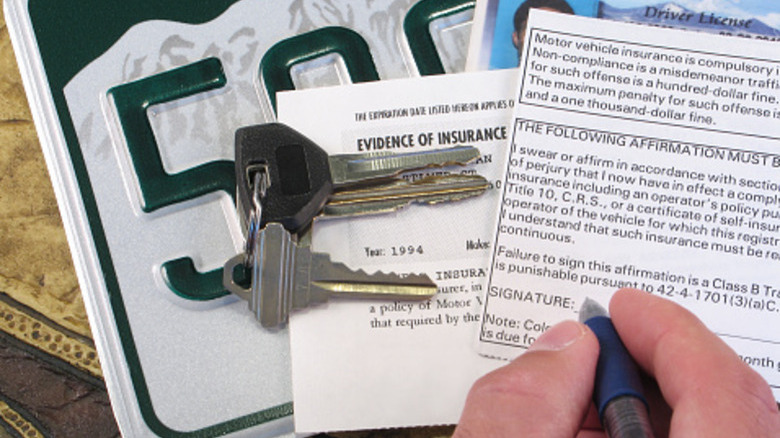How To Sign Over A Car Title
An important part of the process of selling your vehicle is properly transferring the title to its new owner, especially if this transaction takes place outside the confines of a car dealership, which typically handles all the paperwork for you. Proper transfer of title to the new owner in a private-party transaction is crucial because they'll use the document to register the vehicle with their local Department of Motor Vehicles.
Information on the title typically consists of the make and model of the vehicle, its Vehicle Identification Number (VIN), current mileage (odometer reading), and the owner's name. Basically, the title proves that you're the registered owner of the vehicle and therefore, able to legally sell it. Think of it as the automotive version of the deed for a house.
If a title has been destroyed or misplaced, you may need to contact your local DMV to go through the process of obtaining a replacement before the vehicle can be sold. Also be aware that increasingly, some states hold titles electronically and won't automatically mail you a paper copy of the title unless you request it. To be on the safe side, buyers and sellers might consider a trip to the DMV together to complete the purchase transaction in case any additional documents are required or a signature needs to be notarized.
Also consider making a bill of sale
It's called signing over a title for a reason, and indeed, the process is nearly as simple as the rightful seller adding their signature in the correct place. If the car's title has multiple owners listed, they'll all need to sign unless the names of the owners are separated by the term "or," in which case any of the owners can sign. If any errors are made, resist the urge to cross them out or use white-out because the title is an official document. Instead, a proper correction form or other suggestion should be proffered from the DMV.
Another document besides the title that you might consider adding to the transaction is a bill of sale. Not all states require a bill of sale, but it's probably a good idea to draft one anyway. Among other things, a bill of sale establishes the sales price so the new owner can pay the appropriate amount of sales tax when registering the vehicle.
A bill of sale is also handy for memorializing the sale. For example, if the new owner fails to register the vehicle and it's involved in an accident, the commission of a crime, or accumulates parking tickets, you'll have proof that you are no longer the owner. Depending on where you live, some states may have an official bill of sale form that can be obtained electronically or in person from the DMV. Otherwise, generic versions are available on certain legal websites.
What if you still owe money on a loan?
If, like many folks, you still owe money on a loan for the car you're selling, the process is more complicated. That's because lenders typically retain or place restrictions on — known as a lien — a vehicle's title until the loan is paid in full and not all sellers have the financial ability to pay the balance of the loan in full before receiving payment from the buyer.
It's best to ask your lender about the exact procedure, but in a worse case, this can be a tenuous situation between buyers and sellers because the buyer may have to accept the vehicle just a bill of sale until the seller remits the proceeds from the sale of the vehicle to the lender to free up the title. If you're the buyer, that thought might be slightly unsettling even though you're in possession of both the vehicle and a bill of sale documenting the transaction. It may also make it more challenging to drive the vehicle until the title situation is resolved, although certain states have a grace period that allows driving for a short period of time using only the bill of sale, while other states may be willing to issue a temporary license plate.
If the lender is a bank or credit union that has a physical branch nearby to where the transaction is taking place, the two parties can meet there, which lends an air of confidence to the transaction since the buyer can witness that their purchase funds are indeed being applied to paying off the loan.


